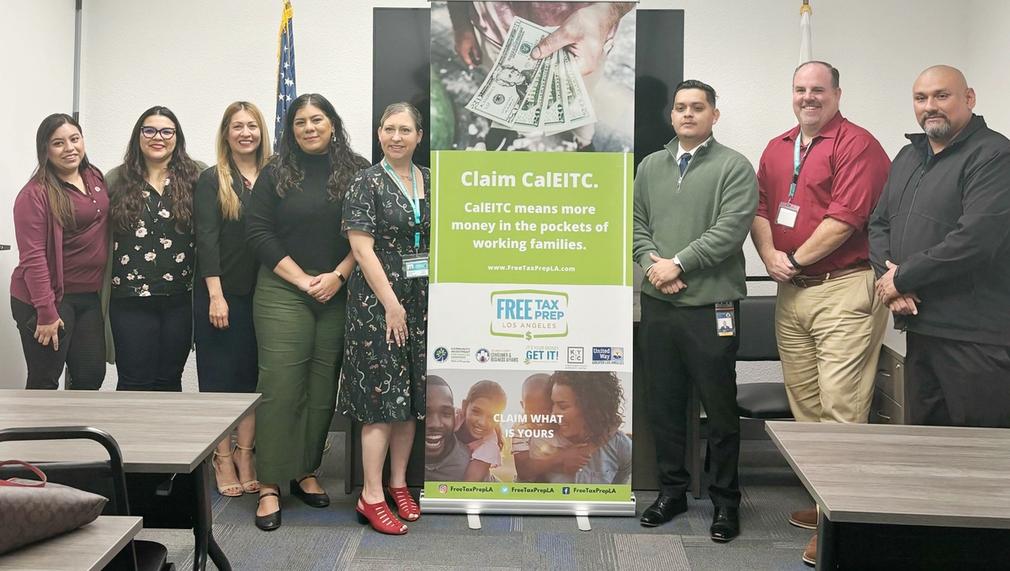Claim Your Cash LA (CYCLA) Pilot
ESP seeks to expand CYCLA, a groundbreaking pilot launched in early 2024 to connect low-income families that have existing interactions with county agencies to free tax prep services. The lowest-income households, families of color, and single-parent households are most likely to miss out on hundreds or thousands of dollars in tax credits due to the cost, time and complexity involved in filing taxes. ESP designed CYCLA to be a scalable model of collaboration between agencies in order to meet the needs of the low-income households they serve.

What is the primary issue area that your application will impact?
Income inequality
In what stage of innovation is this project, program, or initiative?
Pilot or new project, program, or initiative (testing or implementing a new idea)
What is your understanding of the issue that you are seeking to address?
Hundreds of thousands of low-income California families every year do not claim tax credit money they are owed. Many families do not realize they are eligible for these credits because they are unconnected to the tax system (their incomes are so low they are not required to file). Many other low-income taxpayers who do file end up spending large portions of their return paying commercial tax preparers for a service that should be free. Under the current system, then, money that is meant to go toward tax credits for low-income households is either unclaimed or being diverted to tax prep fees, generating more profit for tax prep companies. Between federal and state tax credits, approximately $500 million should be going to over 4.2 million California families. But by both practice and design, many who have the hardest time getting these tax credits are those who need them the most.
Describe the project, program, or initiative this grant will support to address the issue.
Claim Your Cash LA is a groundbreaking pilot that ESP launched in early 2024 in LA County to increase uptake of tax credits by connecting low-income families that have existing interactions with county agencies to a community organization providing free tax prep services (Volunteer Income Tax Assistance [VITA] sites). The concept is simple in theory, but complex in practice – the pilot was designed to provide a "warm handoff", wherein county staff talk directly to people seeking social services and/or benefits (such as CalWORKs, or job assistance), and ask them about tax filing. Those county employees then use a dedicated hotline to sign people up for free tax prep at a VITA site, whose capacity was increased as part of the funding for this pilot.This extraordinary intervention goes well beyond handing out flyers or providing a number a person can call later, and it considers the fact that tax filing is daunting, particularly for those who are not required to do it. This approach leverages trust and a coordinated network to overcome the fear, confusion and misinformation that typically result in non-filers declining to access their credits. ESP has worked for the past year and a half to engage essential county agencies and best-positioned community organizations to design and commit to participating in this effort. In Year 1, CYCLA has won the Bronze Eagle from the LA County Quality and Productivity Commission, as well as a National Association of Counties Achievement Award.
Describe how Los Angeles County will be different if your work is successful.
LA County households leave roughly half a billion dollars in refundable state and federal tax credits on the table annually. If our work is successful, we will be able to reach these "nonfilers", divert filers who pay to file, and build a durable, sustainable system that leverages existing governmental structures in support of low-income households. The hundreds or even thousands of dollars in tax credits for which these households are eligible would have an outsize impact on their financial stability, as well as their sense of dignity and self-determination. This is one reason ESP has focused on tax credits as a meaningful intervention: they put cash directly in people’s pockets so that families can decide how to best meet their needs.
What evidence do you have that this project, program, or initiative is or will be successful, and how will you define and measure success?
Through evaluating this pilot in Year 1 and Year 2, ESP expects to learn a tremendous amount about the cracks that people fall through when attempting to claim their tax credits. While we hope to reach as many LA County residents as possible with this exceptional intervention, we ultimately have our sights set on system-wide automatic filing as the best way to bolster the financial security of low-income families. That would require full pre-population of tax returns, with taxpayers simply reviewing and confirming their data, as is standard in many other countries. It would also mean automatic payment of tax credits directly into bank accounts – ideally on a monthly or quarterly basis. These crucial modernizations are within arm’s reach if we take advantage of the current moment and the data our pilot generates. Together we can ensure that government is accountable and successful in providing these benefits, paving the way for a system that truly supports the families most in need.
Approximately how many people will be impacted by this project, program, or initiative?
Direct Impact: 1,000.0
Indirect Impact: 4,000.0